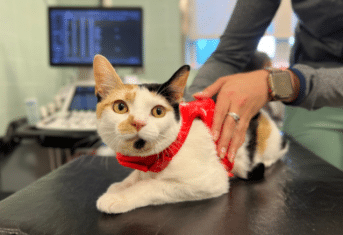Dogs Get Cirrhosis? Cats Get Lung Cancer?

Dogs Get Cirrhosis? Cats Get Lung Cancer?
From a medical perspective, we are not that different from our pets. Humans, dogs and cats have many diseases in common and the treatments for these diseases are often strikingly similar. Diabetes in pets is treated with a special diet and insulin injections; radioactive iodine therapy is used to treat feline hyperthyroidism; and dogs with heart disease receive diuretics (water pills) and ACE inhibitors. Despite these similarities, disease in our pets is not always the same as it is in humans.
Dogs Get Cirrhosis?
In people, cirrhosis of the liver is most often associated with alcoholism, or hepatitis virus infection. Since dogs don’t drink (or they shouldn’t) and the hepatitis virus is a human virus which does not infect dogs, how do dogs get cirrhosis? The diagnosis of cirrhosis does not imply a cause and the cause in dogs differs from humans. Cirrhosis is a liver disorder in which the liver loses its normal structure and function as a result of chronic inflammation. Inflammation, in turn, causes replacement of normal liver cells with scar tissue and destroying their function. If enough of the liver is damaged, dogs show signs of liver failure: jaundice, accumulation of abdominal fluid (ascites) and a bleeding tendency. Labrador Retrievers, Cocker Spaniels and West Highland White Terriers are breeds with an increased risk for developing liver inflammation and cirrhosis. The inciting cause of the inflammation in dogs remains a mystery.
Lung Cancer in Nonsmokers?
The number one cause of lung cancer in humans is cigarette smoking. Since pets don’t smoke, why do they get lung cancer? Veterinarians don’t know exactly. Studies evaluating the impact of the home environment on dogs with lung cancer did not find an association with either living in an urban or a rural environment. We know secondhand smoke affects pets, increasing their risk of lymphoma and oral squamous cell carcinoma, but secondhand smoke has not yet been linked to lung cancer in dogs and cats. If you smoke, don’t do so near your pet; better yet, quit.
But What About Heart Attacks?
Heart attacks, a leading cause of sudden death in the United States, occur when the blood flow to the heart is abruptly blocked. Most heart attacks are the result of high cholesterol and blockage of the coronary arteries which supply blood to the heart muscle. Dogs and cats do not develop coronary artery disease as a result of high cholesterol, and thus do not have heart attacks like their human companions. However, since heart attacks often cause sudden death, grieving families frequently blame a heart attack when their pet dies unexpectedly. Heart disease in pets can be a cause of sudden death due to abnormal heart rhythms, ruptured heart valves and bleeding tumors of the heart.
To read more on disease affecting pets and people, read some of our previous blog posts.

































